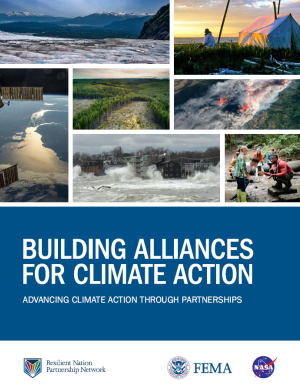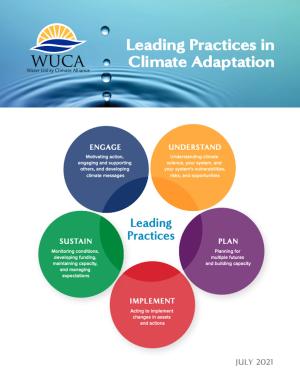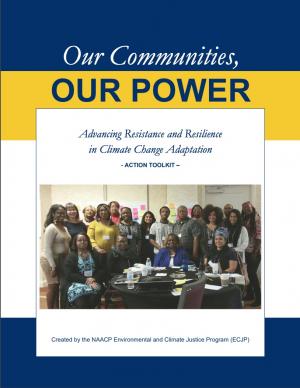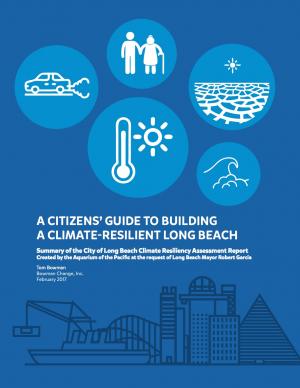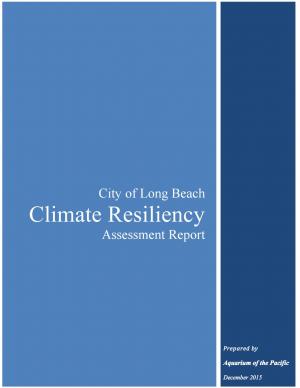Access a range of climate-related reports issued by government agencies and scientific organizations. Browse the reports listed below, or filter by scope, content, or focus in the boxes above. To expand your results, click the Clear Filters link.
To become climate resilient requires collective action. Our efforts must take a Whole-of-Government and Whole Community approach.
The Resilient Nation Partnership Network is working to address this through partnership. The result of our collective action is this Building Alliances for Climate Action resource. It is the work of many organizations and individuals, including federal representatives, faith leaders, community-based organizations, mayors and many more. At a time when many are searching for direction on how to address the climate crisis, this resource represents a unifying voice, helping guide the Whole Community forward
This collection of leading practices in climate adaptation covers a suite of climate adaptation actions and is intended to broadly promote collaborative learning. Each practice in the collection is explained and supported by concrete examples. These practices are drawn from WUCA work products and WUCA members' experiences, and, when possible, connected to relevant resources and related efforts. Most of these practices are appropriate for water utilities of any size, as well as other sectors interested in climate adaptation.
The current practices and where they are placed within the five essential climate adaptation action areas:
- Engage
- Understand
- Plan
- Implement
- Sustain
It is important to note that these action areas and leading practices are not prioritized. Instead, the most useful practices depend on the individual organization's needs and priorities.
The Beloved Community is a vision for our future where all people share equally in the wealth and bounty of the earth, where we protect its abundance, diversity, and beauty for future generations. In this vision of liberation, racism, exploitation, and domination are replaced by democracy, cooperation, interdependence, and love. To get there, we pursue transformative, systems-change solutions. What do we mean by this? The root causes of the problems our communities face—like climate change, racism, and economic inequality—are all deeply connected. Since the problems are connected, so are the solutions. The purpose of this toolkit is to put us on the path toward achieving this vision. Through the context of building equity and resilience into climate adaptation planning, we introduce strategies to transform our communities and, by extension, society. Our ultimate goal is to create lasting and systemic change. At the same time, we recognize the urgency of the issues our communities face and the need to take action now. That is why we pursue change at every scale—from policy changes to community-based projects—to institute the transformative change we need to uphold our vision of the beloved community.
This user-friendly summary is based on the 2015 report “City of Long Beach Climate Resiliency Assessment Report" and “Appendices” prepared by the Aquarium of the Pacific at the request of Mayor Robert Garcia. The report includes clear infographics that describe current and projected conditions in the city. It also describe what the city is currently doing and what else the city and its residents can do.
In January 2015, Long Beach Mayor Robert Garcia asked the Aquarium of the Pacific to take a lead in assessing the primary threats that climate change poses to Long Beach, to identify the most vulnerable neighborhoods and segments of the population, and to identify and provide a preliminary assessment of options to reduce those vulnerabilities. Over the course of 2015, the Aquarium hosted and participated in meetings and workshops with academic and government scientists, business and government leaders, local stakeholders, and Long Beach residents to discuss key issues facing our community as the result of climate change. This report, completed in December 2015, represents the culmination of these efforts. The report offers detailed assessments of the five main threats of climate change to Long Beach: drought, extreme heat, sea level rise and coastal flooding, deteriorating air quality, and public health and social vulnerability. It also provides an overview of what is currently being done to mitigate and adapt to these threats, and other options to consider. Finally, this report presents a series of steps and actions that city leaders and community stakeholders can use as a template for making Long Beach a model of a climate resilient city.
Successfully negotiating climate change challenges will require integrating a sound scientific basis for climate preparedness into local planning, resource management, infrastructure, and public health, as well as introducing new strategies to reduce greenhouse gas emissions or increase carbon sequestration into nearly every sector of California’s economy. This Research Plan presents a strategy for developing the requisite knowledge through a targeted body of policy-relevant, California-specific research over three to five years (from early 2014), and determines California’s most critical climate-related research gaps.
This plan—an update to the 2009 California Climate Adaptation Strategy—augments previously identified strategies in light of advances in climate science and risk management options.
In determining appropriate adaptation strategies, project staff worked with participants to survey a wide range of potential strategy options and develop a process for evaluation and prioritization of targeted strategies.
King County in Washington State has established a comprehensive program to prepare for climate change, and many of the tools and strategies that King County has employed can be applied in other communities. This memorandum from the King County Office of Strategic Planning and Performance Management, published by the American Planning Association, describes strategies developed in King County to direct local government efforts to address climate change.

